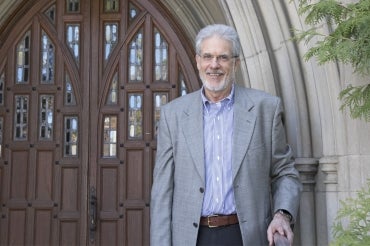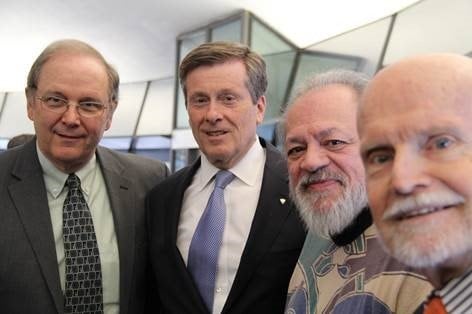Principal of Emmanuel College instrumental in bringing world’s largest interfaith event to Toronto

Published: May 8, 2017
The Parliament of the World's Religions, a global event bringing together leaders from the world’s major religions, is coming to Toronto in 2018, thanks in large part to a group led by Emmanuel College Principal Mark Toulouse.
The world's largest interfaith event has taken place six times since 1893, but this will be the first in Canada. The Dalai Lama, Archbishop Desmond Tutu and former U.S. president Jimmy Carter have all attended past gatherings. More than 10,000 people representing 30 faiths are expected to attend the seven-day Toronto event that will include workshops as well as art exhibitions and cultural performances.
Register for the Parliament here
Emmanuel College is part of Victoria University in the University of Toronto. U of T News spoke with Toulouse, who is also co-chair of a committee of interfaith groups that helped to bring the event to Toronto.
What did it take to convince parliament organizers to bring the event to Toronto?
One of them told me this was the shortest period of time from a site visit to a press conference. When they came to Toronto for the first time in 2016, they fell in love with the city and the diversity and pluralism of religious presence resonated with them. It wasn't hard to convince the committee – they really were so enthusiastic about Toronto. There were other cities bidding, but Toronto was just natural for the parliament.
Is it too early to know who will be attending this year?
It's too early – but the Dalai Lama has often been to the parliament and spoken, and I think so long as the Dalai Lama's health is good, it's likely he will be present.

From left to right, Parliament of the World's Religions' Board Chair Robert Sellers, Mayor John Tory, Andras Corban Arthen, founder of the EarthSpirit Community, and Larry Greenfield, executive director of the parliament, at the City Hall event announcing Toronto as the host city for the event Nov. 1 to 7, 2018 (photo courtesy of Enterprise Canada)
What makes the parliament such an important event?
I think there's nothing more important these days than understanding one another, dispelling myths and rumours about various religious groups, coming to a genuine understanding of each other, and hearing people explain and define who they are on their own terms, instead of defining people by stereotypes or impressions.
One thing the parliament accomplishes is increased understanding between religions, and that creates ambassadors who go back to their own communities and help to dispel the stereotypes with their friends and neighbours and colleagues. Another major dimension of the parliament's work is that [participants] tackle really important social issues – they deal with climate change, poverty. It's bringing together various religious leaders and people who are members in these religious traditions. Many of them become activists on particular social issues, and then apply whatever drives them from their own religious traditions and the values or ethics associated with their beliefs.
The parliament really is driven by a program that enables people to understand the issues across the globe and familiarizes them with important things happening that they might not be aware of. You just get media soundbites, and these days with CNN so driven with analysis of everything Donald Trump does, you really don't hear much about the importance of what's happening in other parts of the world. The parliament lifts up issues of concern that are really afflicting people across the world.
Do people who identify as atheist or agnostic have a place at the parliament as well?
They do, in fact. I think the parliament is recognizing the importance of this category, which is defined as “nones.”
On the one hand, recognizing that even nones and people who might identify with agnosticism or atheism have their own forms of connection to something beyond themselves. Some of them have various spiritualties that get expressed in one way or another that aren't connected with any traditional religious expression.
I think the nones are just as important as any other religious tradition. We shouldn't stereotype anybody, and therefore conversations between religions is not where this thing should stop. The parliament is increasingly developing a section of the program that can address how we hear what it means for atheists and agnostics who are defining values that address social justice issues, and how we can work together to accomplish important ends.


